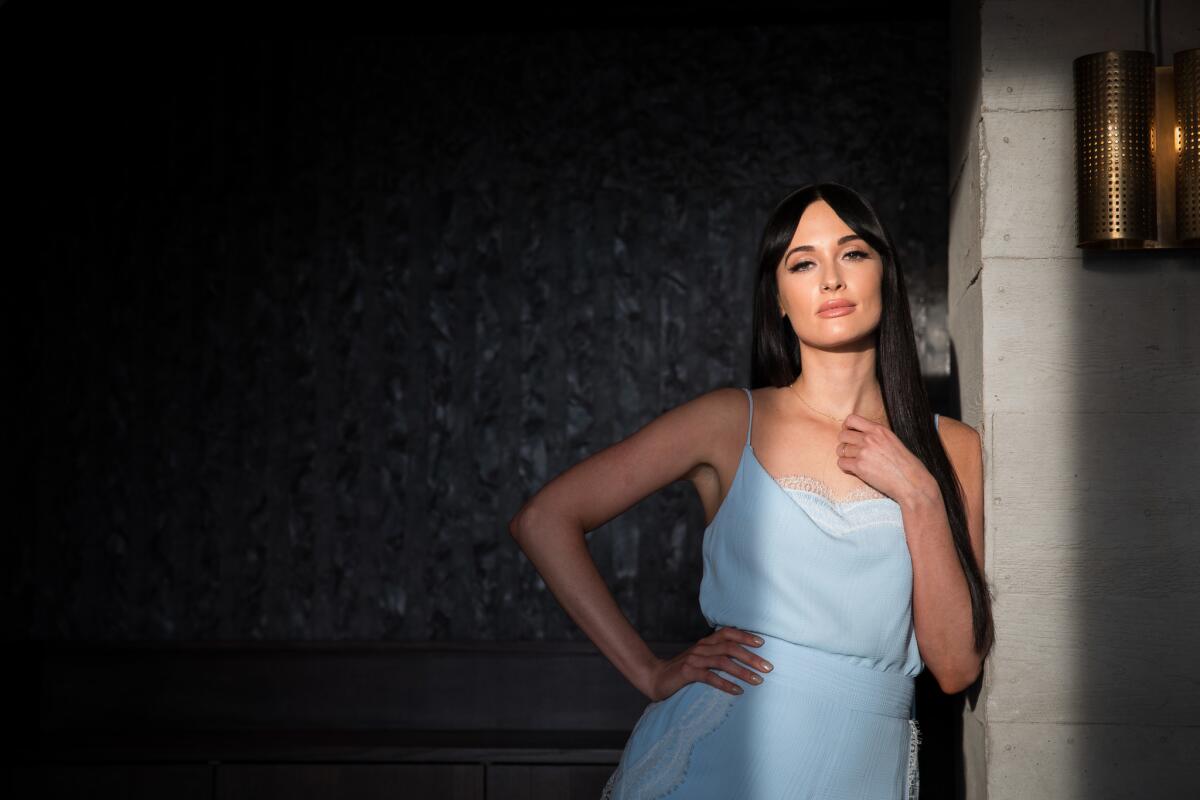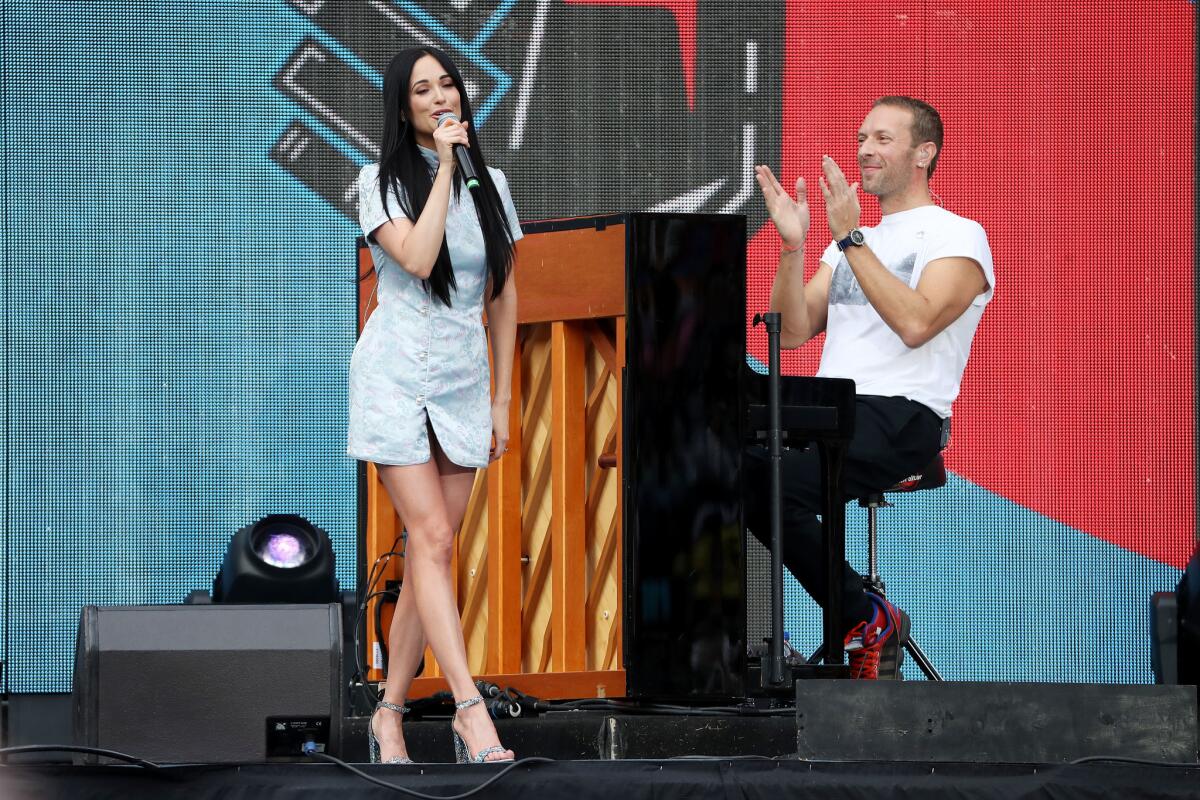Kacey Musgraves envisioned her Grammy-nominated ‘Golden Hour’ as a ‘beautiful hiding place’

- Share via
Kacey Musgraves’ face had “Seriously?” written all over it.
Asked to explain why she’d been nervous to take part in this month’s Global Citizen Festival — a Johannesburg fundraising event at which the country singer performed alongside Beyoncé, Femi Kuti and Coldplay’s Chris Martin — Musgraves laughed and said, “Well, playing an acoustic country-music set in a stadium in Africa is not something I do every day.
“But then I guess I’m getting used to new experiences.”
Indeed, Musgraves’ knockout of a third studio album, “Golden Hour,” is all about novel adventures: Inspired by her recent marriage to fellow singer and songwriter Ruston Kelly, who she says opened her mind “to a kind of love I never really envisioned for myself,” the collection expands Musgraves’ old-fashioned sound with dreamy synth textures and crisp disco beats.
And now it’s brought Musgraves, 30, her first nomination for album of the year at the 61st Grammy Awards, where she’ll also compete for country album, country song (for “Space Cowboy”) and country solo performance (“Butterflies”).
“I just knew this record had to be different,” she said over lunch in New York shortly after her trip to South Africa. Dressed in a black knit jumpsuit with a rainbow across the front, the singer clarified that she wasn’t interested in “getting weird for weirdness’ sake.”
“Third album, you know, I didn’t want it to be like, ‘Where’d she go?’”
But the events of her life since 2015’s “Pageant Material” — not to mention certain events in culture and politics — left Musgraves no choice but to change things up, she added.

She’d started to fear that her music, with its echoes of expert roots-music stylists such as Marty Robbins and Bobbie Gentry, was turning into a throwback caricature that concealed “the whole modern side of me.”
And meeting Kelly — the two first locked eyes at a songwriters showcase at Nashville’s famed Bluebird Cafe — transformed her thinking about romance and about whether it was something worthy of singing about.
“Relationship songs always got on my nerves before,” she said over a salad. “I wanted to talk about the world and where I came from” — rich topics this native of tiny Golden, Texas, covered with smarts and wit on “Pageant Material” and her 2013 major-label debut, “Same Trailer Different Park.” (An oft-quoted line from her breakout single, “Merry Go ’Round”: “Mama’s hooked on Mary Kay / Brother’s hooked on mary jane / And Daddy’s hooked on Mary two doors down.”)
“But then all of a sudden I was in this rosy glow,” she said of her romance. “And I wanted to share that.”
For Musgraves, who says her older work painted her not unfairly as a cynic, the optimism of “Golden Hour” — its belief in happiness and her entitlement to it — registers as a distinct shift. It also makes the album, at a moment of turmoil related to #MeToo and, for many, President Trump, feel something like a refuge.

“A beautiful hiding place” is how Musgraves describes what she and her co-producers, Ian Fitchuk and Daniel Tashian, were aiming to create with songs whose relaxed tempos and lush harmonies can recall Sade and the Bee Gees as much as Gram Parsons and Dolly Parton.
“The thing I love about pedal steel,” Musgraves said of the album’s often-trippy arrangements, “is that it can be extremely down-your-throat country or it can sound like a whale.”
That sense of juxtaposition drives tunes like “Happy & Sad,” which the singer said she wrote after an emotional evening with Kelly at a tiki bar in Palm Springs, and “High Horse,” which pairs playful Wild West imagery with a throbbing groove more expected of Musgraves’ onetime tourmate Katy Perry.
When “High Horse” was released as a single over the summer, many expected the song to do Katy Perry-size business, which didn’t quite happen. (“High Horse” peaked at No. 36 on Billboard’s country chart.)
“I can’t say that wasn’t a disappointment,” Musgraves said, though she added that huge success with the song may have ended up turning off new listeners who checked out her delicately mellow album expecting 10 or 11 more “bangers.”

And, besides, Musgraves is hardly lacking for acclaim this year. “Golden Hour” has come in near the top of many critics’ year-end lists, and last month it was named album of the year at the Country Music Assn. Awards — one sign that the Nashville establishment has embraced Musgraves even as that otherwise dude-dominated ceremony illustrated the industry’s profound gender imbalance.
“Just play good music,” she said the same week Billboard reported that, for the first time, its country airplay chart featured no women in the top 20. “Why’s it so hard?” She paused.
“I have to say, though, that radio isn’t just to blame. I’ve talked a lot about the fact that radio won’t play me, but quite honestly they’re not really given the chance to.”
Record labels promote male artists harder than female, Musgraves explained. “And it doesn’t matter the quality. You could hand them the best record in the world, but you’re not going to get the same excitement or opportunities.
“It’s not just gender, either,” she continued. “There are so many areas in country music where it’s unequal. Where are the country musicians of color? I’d love to have a gay country star.”
As she spoke, Musgraves’ passion was clear. Having broadened her own vision of a beloved form steeped in tradition, she’s eager for others to do the same.
“We need that perspective in country music because there’s a ton of kids out there who’ve grown up in small towns that need a hero,” she said. “Let’s hear about that side of love.”
Twitter: @mikaelwood
More to Read
The biggest entertainment stories
Get our big stories about Hollywood, film, television, music, arts, culture and more right in your inbox as soon as they publish.
You may occasionally receive promotional content from the Los Angeles Times.











